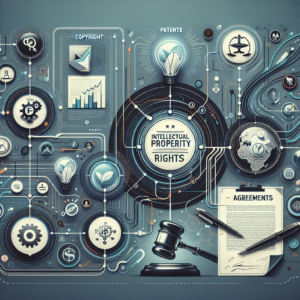Unprecedented Online Piracy Crackdown: The Digital Underworld Under Siege
[caption id="attachment_35116" align="alignnone" width="578"] Intellectual Property[/caption]
In an unprecedented move, global authorities have intensified their efforts to combat online piracy, targeting the vast digital underworld that has long operated with relative impunity. This crackdown, which has seen coordinated actions across multiple jurisdictions, aims to dismantle the networks that facilitate the illegal distribution of copyrighted content. As the digital landscape continues to evolve, the implications of these efforts are profound, affecting not only the perpetrators of piracy but also content creators and consumers alike.
Understanding the Scope of the Recent Online Piracy Crackdown Efforts
The recent crackdown on online piracy has been characterized by a series of high-profile operations that have led to the shutdown of numerous illegal streaming sites and torrent platforms. Authorities have reported a significant increase in the number of raids and arrests, with law enforcement agencies collaborating across borders to target organized crime syndicates that profit from the unauthorized distribution of films, music, and software. This multifaceted approach includes not only the dismantling of websites but also the prosecution of individuals involved in the creation and dissemination of pirated content. The scale of these operations underscores a growing recognition of the economic and cultural damage caused by digital piracy, prompting a united front among nations to address this pervasive issue.
Key Players Involved in the Global Fight Against Digital Piracy
The fight against online piracy involves a diverse coalition of stakeholders, including government agencies, law enforcement, content creators, and industry organizations. Notable players include the Motion Picture Association (MPA), the Recording Industry Association of America (RIAA), and various international law enforcement bodies such as Interpol and Europol. These organizations have been instrumental in coordinating efforts, sharing intelligence, and providing resources to combat piracy. Additionally, technology companies are increasingly joining the fray, developing tools and platforms that assist in identifying and reporting piracy. This collaborative approach highlights the recognition that combating digital piracy requires a concerted effort from multiple sectors to be effective.
The Impact of Enhanced Enforcement on Online Piracy Networks
The enhanced enforcement measures have had a significant impact on online piracy networks, leading to the disruption of established operations and a noticeable decline in the availability of pirated content. Many prominent piracy websites have been taken offline, and their operators face legal repercussions that serve as a deterrent to others. However, the crackdown has also led to a shift in tactics among pirates, who are now employing more sophisticated methods to evade detection, such as using decentralized networks and encrypted communication. While the immediate effects of the crackdown are evident, the long-term implications for piracy networks remain uncertain as they adapt to the changing landscape of enforcement.
Legal Frameworks Supporting the Crackdown on Digital Piracy
The legal frameworks supporting the crackdown on digital piracy are evolving to address the complexities of the digital age. Many countries are strengthening their copyright laws and enhancing penalties for copyright infringement to deter potential offenders. International treaties, such as the Agreement on Trade-Related Aspects of Intellectual Property Rights (TRIPS), provide a foundation for cooperation among nations in enforcing copyright protections. Additionally, recent legislative efforts in various jurisdictions aim to streamline the process for obtaining court orders to block access to infringing websites, thereby making it more difficult for pirates to operate. These legal advancements reflect a growing commitment to protecting intellectual property rights in an increasingly digital world.
Technological Innovations Aiding in the Detection of Piracy Activities
Technological innovations are playing a crucial role in the fight against online piracy, with advancements in artificial intelligence (AI) and machine learning enabling more effective detection of infringing content. These technologies can analyze vast amounts of data to identify patterns associated with piracy, such as the distribution of copyrighted material across various platforms. Additionally, digital watermarking and fingerprinting techniques are being employed to track the unauthorized use of content, allowing rights holders to take swift action against infringers. As technology continues to evolve, it is expected that these tools will become even more sophisticated, further enhancing the ability of authorities and content creators to combat piracy.
Future Implications for Content Creators and Consumers in the Digital Age
The ongoing crackdown on online piracy carries significant implications for both content creators and consumers. For creators, enhanced enforcement may lead to increased revenues and a more sustainable business model, as the illegal distribution of their work diminishes. This could encourage greater investment in original content, fostering a more vibrant creative industry. However, consumers may face challenges as the availability of free or low-cost pirated content decreases, potentially leading to higher subscription costs for legitimate services. The balance between protecting intellectual property and ensuring access to content will be a critical issue as the digital landscape continues to evolve, necessitating ongoing dialogue among stakeholders.
The unprecedented crackdown on online piracy marks a pivotal moment in the ongoing battle to protect intellectual property rights in the digital age. As authorities and industry stakeholders unite to dismantle piracy networks, the implications for content creators and consumers are profound. While the immediate effects of enhanced enforcement are evident, the long-term landscape of digital content distribution remains uncertain. As technology and legal frameworks continue to evolve, the fight against online piracy will undoubtedly shape the future of how content is created, shared, and consumed in an increasingly interconnected world.
